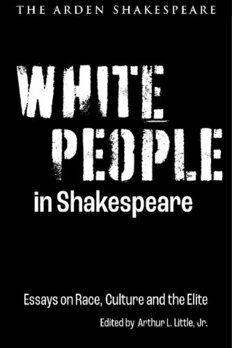
White People in Shakespeare: Essays on Race, Culture and the Elite PDF
321 Pages·2022·17.33 MB·English
Most books are stored in the elastic cloud where traffic is expensive. For this reason, we have a limit on daily download.
Preview White People in Shakespeare: Essays on Race, Culture and the Elite
Description:
This edited collection looks at how Shakespeare’s early modern stage turned the English masses into ‘white people’ and how white people, especially from the 19th century forward, used Shakespeare to rationalize and aestheticize the privileges granted them as white people.This collection explores the relationship between Shakespeare and whiteness in the early modern past, the role of Shakespeare in white-nation-making, and the function of white Shakespeare and white Shakespeareans in the academy. White People in Shakespeare argues that early modern English theatre was crucial to the development of whiteness as an embodied identity and that this legacy continues to shape Shakespeare’s reception in many areas of culture. The scholars contributing to this collection have expertise in theater studies, global studies, race studies, white studies, religious studies, feminist studies, presentism, new historicism, and archival studies. The collection moves across most of Shakespeare’s genres, including his poetry, and explores how whiteness affects the reception of Shakespeare’s work and uses made of it in the theater, the classroom, and other key sites of culture.
See more
The list of books you might like
Most books are stored in the elastic cloud where traffic is expensive. For this reason, we have a limit on daily download.
